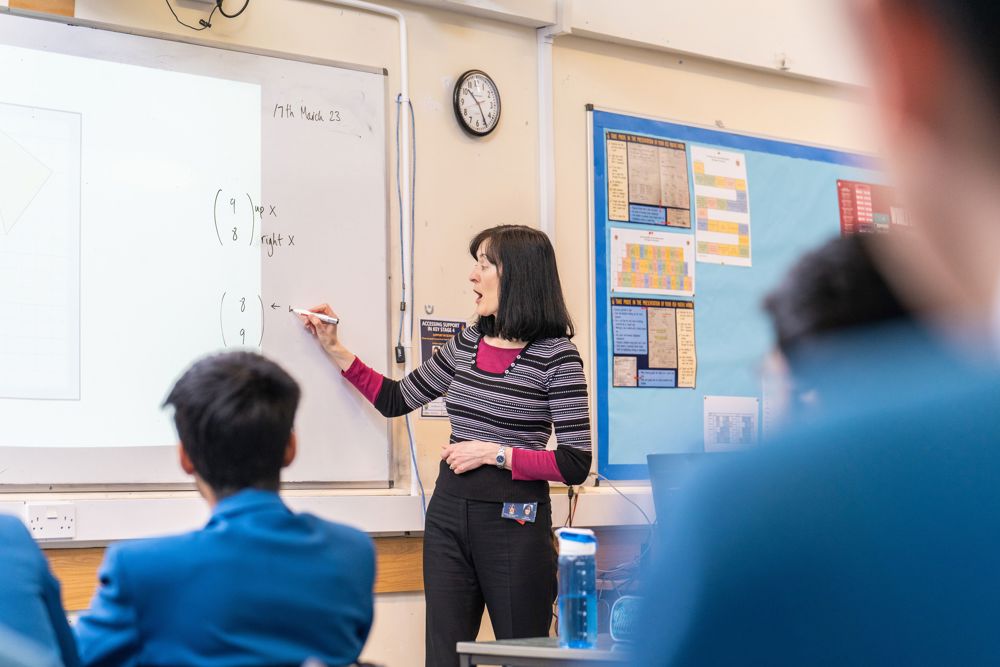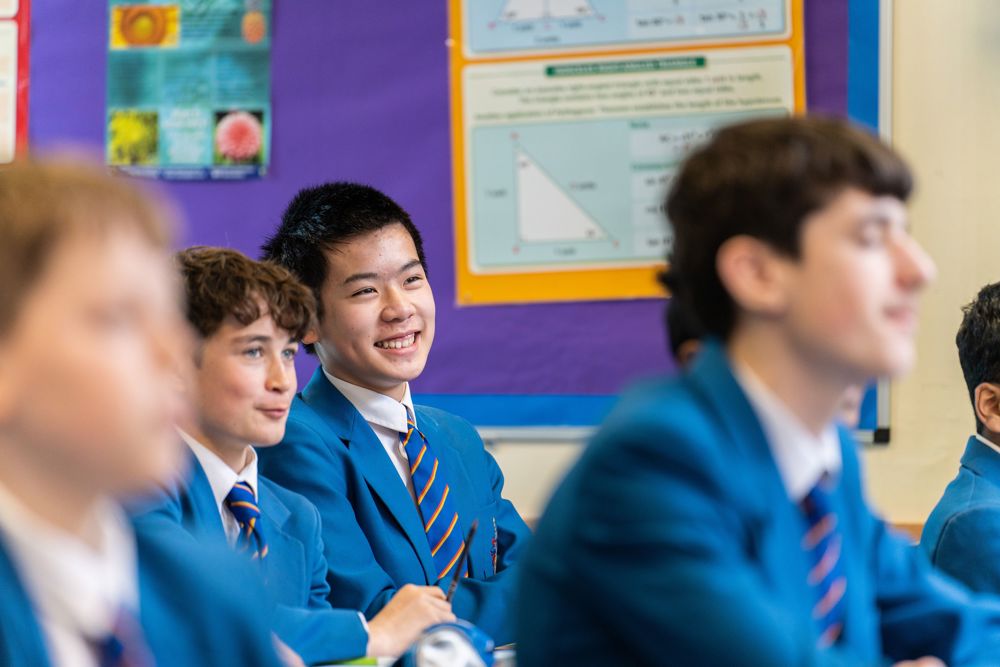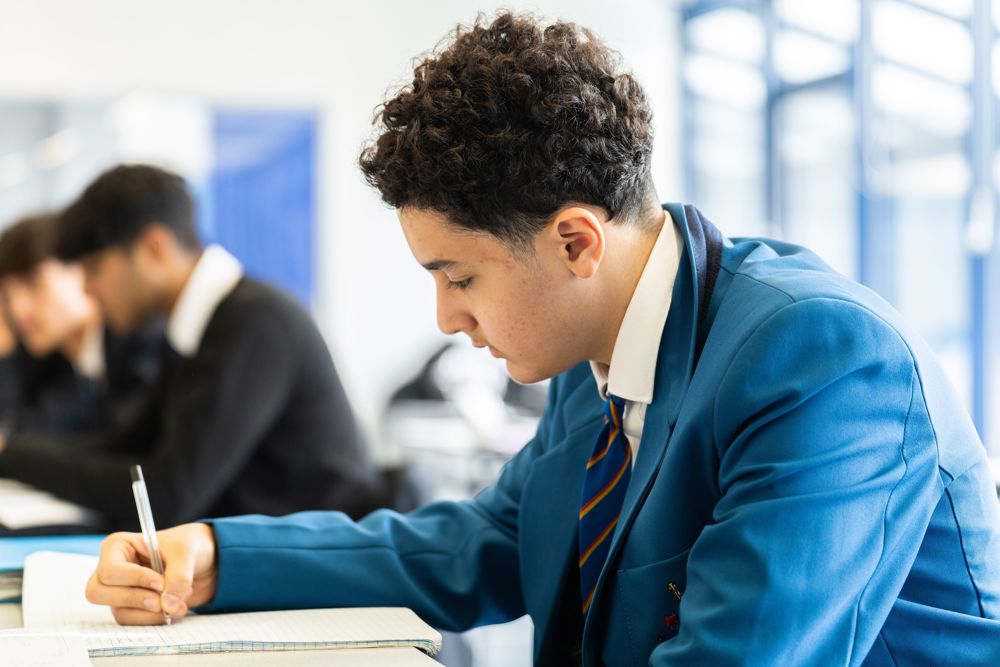
Maths
The Mathematics Department inspires pupils to think creatively and independently, fostering an enthusiasm for Mathematics and setting the foundation stones for success at GCSE, A Level and beyond.
Students learn to appreciate Mathematics both as the key to unlocking the sciences and economics, and as a discipline with its own unique beauty and fascination. Teachers encourage a spirit of intellectual inquiry in learners, who use applied and abstract concepts to solve problems and deepen their understanding of the subject.
Curriculum Map

Key Stage 3
Pupils build a solid foundation of skills and techniques during their first three years at the school, which form the basis for GCSE study in Key Stage 4. In Years 7 and 8 learners have six periods of Mathematics a fortnight, and seven periods a fortnight in Year 9. Students are taught in mixed-ability groups in Years 7 and 8 and are divided into six sets of three ability levels in Year 9. Pupils can expect one 60-minute homework task a week and are tested in each order period with two one-hour exams (one calculator, one non-calculator) at the end of each year.
Year 7
Algebraic rules for sequences. Finding different averages and comparing them. Using and evaluating formulae. Equations of graphs. BODMAS.
Year 8
Using prime factors for LCM and HCF. Percentage increases. Equations of straight lines. Standard form. Circle area and circumference.
Year 9
Equations with fractions. Averages from grouped data. Exponential growth graphs, Pythagoras’ Theorem. Trigonometry. Simultaneous equations.
Useful Links

Key Stage 4
Pupils study the AQA Specification for Mathematics GCSE and are taught for six periods a fortnight. Learners are expected to complete one substantial piece of homework a week. For the examinations, there are three one-and-a-half hour papers (one non-calculator, two calculator) in the summer of Year 11. Currently those in top set also take Additional Maths and students sit a single, two-hour paper in Year 11.
Year 10
Geometric and quadratic sequences. Equations of perpendicular lines. Surds. Graphical inequalities.
Year 11
Algebraic fractions and functions. Properties of circles and their equations. Vectors. Sine rule and cosine rule.

Key Stage 5
Learners study the Edexcel A Level Mathematics Specification, taking Single Mathematics for nine periods a fortnight in Year 12 and ten periods a fortnight in Year 13. Those taking Further Mathematics (including Single Mathematics) have 16 periods a week. Students spend up to five hours a week working on Mathematics outside of lessons and private study time.
Students sit all papers at the end of Year 13. For Single Mathematics there are three two-hour papers, each of which comprise a third of the marks. Papers 1 and 2 are on Pure Mathematics and Paper 3 focuses on Statistics and Mechanics. Further Mathematics requires pupils to sit four one-and-a-half hour papers, each of which make up 25 per cent of the marks.
Entry requirement
Mathematics: Grade 8 GCSE Mathematics (Higher Paper). Further Mathematics: 9 in Mathematics GCSE or C in Additional Maths FSMQ or A in Further Mathematics Level 2 Certificate.
Year 12
Pure Maths – calculus (differentiation and integration), logarithms and exponentials, coordinate geometry of the circle. Mechanics – vector and scalar quantities, constant and variable acceleration kinematics, Newton’s Laws. Statistics – sampling techniques, statistical distributions, hypothesis testing.
Year 13
Pure Maths – functions; modulus, composite, inverse. Parametric equations, differential equations. Mechanics – two-dimensional kinematics, moments and equilibrium in statics, forces and motion with friction. Statistics – hypothesis tests on the mean of a normal distribution, correlation coefficient, conditional probability. Two papers are on Core Mathematics, with one of Further Mathematics and one on Decision Mathematics.
Enrichment
Students with a particular interest in Mathematics are involved in a range of activities including the United Kingdom Mathematics Trust Junior Maths Challenge, the University of Southampton National Cipher Challenge and Mathematics masterclasses hosted by universities. Past students have been accepted on to the United Kingdom Mathematics Trust Mentoring Scheme.
Head of Maths
Kevin Jobson kj@strs.org.uk